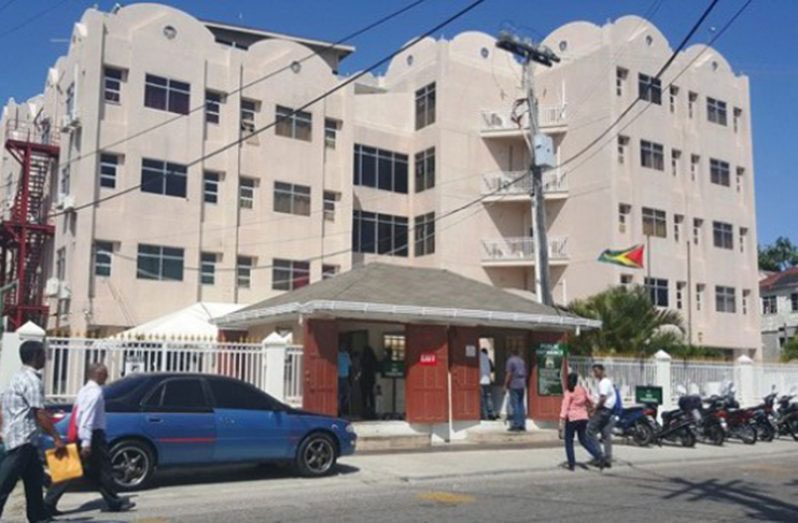SOME import companies operating within Guyana have been manipulating the tax relief measures put in place to reduce and revert freight charges to its pre-pandemic levels. This is according to a notice published by the Guyana Revenue Authority (GRA), which outlined some areas of manipulation that have been “discerned so far”.
These, according to the notice, include the misrepresentation of invoice dates to reflect dates after August 1, 2021, even though goods were shipped prior to that date. The entity in its operations also found that local businesses have been manipulating invoices that reflect only the ‘freight on board’ or FOB charges, and not the prices of ‘cost insurance and freight’ – CIF.
Added to that, the revenue authority found that persons were producing invoices that reflected lower prices of commodities and higher freight charges.
As a result of the findings, the GRA notice encouraged importers “to be compliant and supply the correct invoices to the agency. “Importers are further implored to pass such savings on to the consuming public,” the notice stated.
It also reminded importers of the legal consequences that their non-compliance would attract, and warned that those guilty of tax evasion would be subject to penalties in accordance with the relevant legislation.
REPERCUSSION
“The GRA again advises that those found non-compliant will be subjected to additional taxes, fines, penalties and imprisonment upon conviction,” the notice read.
It was earlier in the month that President, Dr. Irfaan Ali, ordered that freight charges be adjusted to pre-pandemic levels, that is, rates charged before March 2020, effective August 1, 2021.
This, he said, was in direct response to increasing commodity prices fuelled by the pandemic-induced astronomical shipping costs.
The ultimate result of this adjustment to customs duties, excise taxes and input value added tax (VAT) on goods imported, would be the return of $4.8 billion to the pockets of consumers and the business community over the next six months.
Duties, excise tax and input VAT are calculated utilising the cost, insurance and freight of imports, thereby allowing for the increased cost of freight to be passed on to the consumer by the importer.
“…we have recognised the marked increase in shipping costs from some countries which has moved from an average of US$2,500 to as much as US$15,000 per 20-foot container and from US$3,500 to over US$20,000 for a 40-foot container,” President Ali said in a statement released by Office of the President.
It is evident that rising commodity and service prices are not unique to Guyana, as countries the world over have been contending with the COVID-19-induced situation since early 2020.
The International Labour Organisation (ILO), in a report issued in December last year, said that the pandemic, along with the associated lockdowns, mobility restrictions and physical-distancing rules, have not only led to a significant increase in unemployment and considerable income losses for many people, but have also altered the spending patterns of consumers and the level of price inflation [the rate of increase in prices over a given period of time] that they face.
DEMAND AND SUPPLY AFFECTED
In particular, the lockdown measures have affected the supply of, and demand for, certain products and, hence, their prices. In August 2020, according to the ILO, the prices of all goods and services were on average 2.7 per cent higher than in August 2019.
It has been proven that increases in food prices could have a dire impact on living standards of lower income households, which generally spend most of their incomes on food. Even a small increase can confront the members of such households with difficult decisions, the ILO cautioned.
While Guyana is revered as a food-secure nation, the cost of various imported commodities which are oftentimes a necessity, have affected consumers and, by extension, households.
Consequently, having carefully assessed the impact of COVID-19 on the economy and prices passed on to the consumer due to increased shipping/importation costs, President Ali ordered that the necessary adjustments to freight costs be made.
Essentially, those adjustments will be made through amendments to the relevant aspects of the Customs and Value Added Tax Acts. “This measure will allow for a saving of $4.8 billion to the consumer and business community over the six-month period, thereby reducing revenue collections by the similar amount of $4.8 billion,” Dr. Ali had said.
Wary that the benefits are often not transferred to the average citizen, the President affirmed that government agencies will be tasked with ensuring that such savings are passed on to the consumer and not pocketed by “unscrupulous importers.”
This concession granted by the government became effective on all invoices dated August 1, 2021 to January 31, 2022. The announcement of this impending adjustment followed a report that other tax relief measures to support individuals and corporations amid the COVID-19 pandemic were extended to December 31, 2021.
When the measures were announced, the Georgetown Chambers of Commerce and Industry (GCCI) issued a statement which warned importers against behaving in a manner that would be not only unscrupulous, but also unpatriotic, as they would be profiteering off of a measure designed to ease the burden on the Guyanese people.












